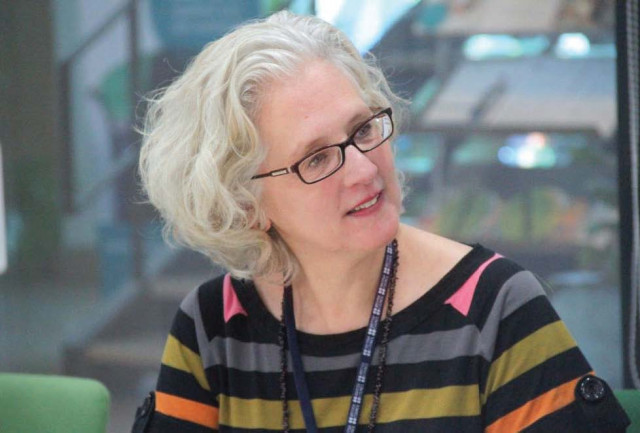Creative writing workshop: Young guns fire off criticism of literary scene
Award-winning author Kate Pullinger to write novel Flight Paths, which will include a character of Pakistani origin.

This, for example, was what a Mass Communications student at the University of Karachi, Atiya Abbas, had to say about Pakistani writers at a creative writing workshop with London-based author Kate Pullinger on Tuesday: “Their work definitely seems artificial. They may have foreign degrees, but using English idioms which do not apply to us at all makes no sense. They don’t write for us but more globally, which is why we don’t connect with them.”
Scathing criticism indeed, but perhaps this is a point of departure for the next generation of talent. The British Council organised the two-day workshop with Pullinger, whose 2009 novel The Mistress of Nothing won the ‘Governor General’s Literary Award for Fiction’, one of Canada’s most prestigious literary prizes. A literary festival will follow in the spring.
The workshop participants were very forthcoming with their opinions on foreign-based authors of local origin. “They pretend when they write, it just doesn’t seem honest,” said Furhan R Hussain, a researcher at the Textile Institute of Pakistan. “All it is, is word play. They portray society not at all like what it is in reality.”
For her part, Pullinger attempted to address this accusation of artifice. “One of the most important aspects of a novel (from a writer’s point) is having characters you believe in,” she said. “Even if the character is a villain, one has to care enough about him or her to make an impression on paper for the reader.”
Syeda Faiza Jamil, also a researcher at the Textile Institute of Pakistan, believed that local writers are “stereotypical” and “at least those based outside the country are trying to give us a different point of view”.
Shifting the focus to discussing the quality of a reporter’s copy of a story, another participant, a sub-editor at The News, Fatima Niazi, said, “many people compile their stories, meaning they just surf the web, put together a bunch of Googled material and call it theirs. There is no thought, research or creativity behind a great deal of the work and therefore their writing lacks reality and emotion. It is compilation journalism.”
The workshop’s participants also hotly debated the age-old difference between public and private educational institutions and which of them offers a greater promise of quality writers. According to Sidrah Gufran, a student at Karachi University, private institutions have a “very closed environment, almost like living in a bubble. There is a lot more diversity at public schools.” She argued that the inspiration to write comes from interacting with people from diverse backgrounds and therefore different attitudes, behaviours and ideas. Her college mate Tehmina Qureshi slightly disagreed. “A public university can make or break you. You tend to get too involved in the politics and corruption of it all. But private universities end up graduating clones with barely any ingenuity.” Ingenuity, Pullinger pointed out was crucial when writing. “Each book has its own atmosphere that is characteristic to that book. This can stem from the author’s stylistic voice,” she explained, adding, “and that is not something you can learn, it’s part of who you are.”
Briefing on contemporary Indian authors, Pullinger said that they occasionally tended to “over do” the vividness while writing which takes away from the reader’s imagination. After the end of the workshop on Wednesday she will be conducting a similar one in Lahore on Nov 25.
Published in The Express Tribune, November 24th, 2010.



















COMMENTS
Comments are moderated and generally will be posted if they are on-topic and not abusive.
For more information, please see our Comments FAQ